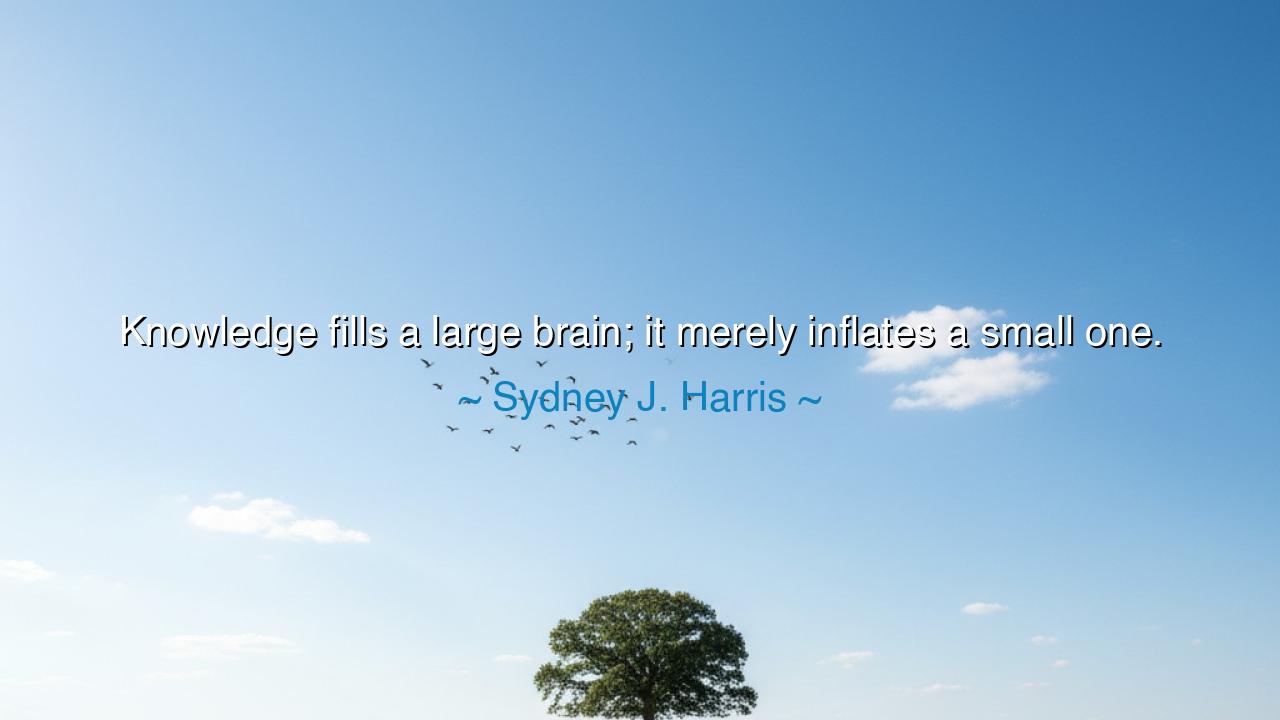
Knowledge fills a large brain; it merely inflates a small one.






The words of Sydney J. Harris — “Knowledge fills a large brain; it merely inflates a small one” — strike like a chisel upon the marble of pride, revealing the eternal difference between wisdom and vanity. In these few words, Harris, the sharp-minded essayist of the twentieth century, exposes one of the oldest truths of humankind: that knowledge, though noble and powerful, is only as great as the vessel that receives it. The wise man gathers knowledge as nourishment for the soul; the fool collects it as decoration for his ego. Knowledge, then, is not virtue in itself — it is potential. And it is the measure of the heart and mind that determines whether it becomes illumination or inflation.
In the style of the ancients, one might say: “The ocean that deepens grows still; the puddle that swells becomes muddy.” Harris reminds us that true understanding humbles the seeker. The more one learns, the more one perceives the vastness of what remains unknown. This awareness breeds reverence, patience, and compassion. But in a shallow mind — in the soul that seeks knowledge only for status or power — each new fact becomes air, swelling arrogance instead of depth. Such a person grows not wiser, but more hollow, puffed up with words yet empty of meaning. Knowledge, in such a case, does not enlighten; it corrupts.
The origin of this insight can be found in Harris’s long career as a journalist and social commentator. He wrote not for scholars, but for the common reader, hoping to awaken in them a moral intelligence — the ability to think, to question, to grow. His essays often warned against the misuse of intellect in an age that valued cleverness over wisdom. His line about the “large brain” and the “small one” was his way of saying that education without humility is like wealth without generosity: impressive from a distance, but barren in the soul. True learning, he believed, must transform character, not just sharpen thought.
History offers countless examples of Harris’s wisdom. Consider the figure of Socrates, the ancient philosopher who, despite being revered as one of the greatest minds in history, declared, “I know that I know nothing.” This humility did not arise from ignorance but from depth — from seeing that knowledge, like the sea, expands as one explores it. Compare him to Alcibiades, his student — brilliant, ambitious, intoxicated by intellect and charm. Alcibiades gained knowledge but not wisdom, and it destroyed him. Where Socrates’s understanding made him serene, Alcibiades’s learning made him reckless. Here we see the two brains Harris describes: one filled with wisdom, the other inflated with pride.
The message reaches beyond philosophy into every realm of life. In our own time, knowledge is abundant and easily acquired — yet wisdom is rare. The age of information has given birth to many who are learned but few who are wise. People speak with authority on matters they barely grasp; opinions multiply, but insight diminishes. The small mind, overwhelmed by access to knowledge, mistakes possession for understanding. The large mind, however, treats knowledge as a sacred trust — something to be refined, tested, and applied with humility.
Harris’s quote also challenges us to look inward. When we learn something new, do we use it to elevate ourselves above others, or to lift others with us? Does our knowledge soften our judgment or harden our pride? The wise student, upon discovering truth, grows gentler and more curious; the arrogant one grows defensive and loud. The true scholar, like a tree, bends under the weight of fruit; the false one stands rigid and empty, rustling with noise but bearing nothing of value.
Let this be the teaching for all who seek to grow: Knowledge is a mirror — it reveals the size of the soul that holds it. To make your mind a large vessel, cultivate humility. Do not learn merely to argue, impress, or dominate, but to understand and serve. Read widely, yes, but reflect deeply. Listen more than you speak. For every fact you acquire, ask how it shapes your character, not just your intellect. In this way, knowledge becomes not air that inflates, but light that fills — turning the mind into a lantern for the world.
And so, remember the wisdom of Harris: the measure of your learning is not how much you know, but how deeply you are changed. A large brain is not large by size or skill, but by spirit — by the humility to keep learning, and the grace to let knowledge make you kinder, quieter, and more aware of the infinite mystery that still surrounds you. For the truly wise, knowledge is not an end, but a beginning — the door through which the soul steps, again and again, toward truth.






AAdministratorAdministrator
Welcome, honored guests. Please leave a comment, we will respond soon